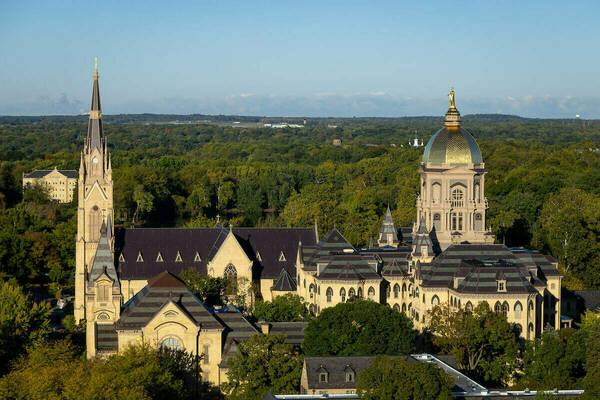Heritage in the kiln: Renewal and sustainability through traditional brickmaking
Have you ever considered the bricks in the walls that surround you, the walls of your home, your classroom or your office? Alumni of this University probably know the story behind the “Notre Dame Brick” that gives some of the oldest buildings on campus their distinctive buff-yellow hue. But beyond a handful of specific historical instances, how many of us have ever thought about where the bricks in our walls came from, the origin of their raw clay, the process by which they were molded or the kiln in which they were fired?
Research into traditional brickmaking in the central Italian region of Umbria by two University of Notre Dame School of Architecture students, Jack Harrington '23 and Nathan Walz '24, provokes such questions about our built environment, the structures we have inherited from the past, created ourselves, and those we will build in the future.
Supported by a summer research grant from the Nanovic Institute for European Studies, a unit within the Keough School of Global Affairs, Harrington and Walz traveled to the village of Castel Viscardo, near the city of Orvieto, in June to document the process of traditional brick making at Fornace Bernasconi, a historic kiln now in its second generation of production. Led by master brickmaker Luigi Bernasconi, the facility is renowned for its bricks, tiles and other terra cotta elements that have helped restore and preserve some of Italy's most treasured structures including the Colosseum and the imperial building on the Palatine.
Read more here.
Latest Colleges & Schools
- Notre Dame receives $2.5 million gift from Coca-Cola to expand entrepreneurship programs into FIFA World Cup 26 host citiesThe Coca-Cola Company in North America has awarded a $2.5 million gift to the University of Notre Dame’s Urban Poverty and Business Initiative (UPBI). The initiative brings together universities and nonprofit organizations committed to alleviating poverty and helping low-income and underprivileged individuals launch and grow sustainable businesses. The gift will enable UPBI, housed within the University’s Keough School of Global Affairs, to expand its network of partner organizations across the United States and into Canada, including cities that will host the FIFA World Cup 26.
- Faculty receive prestigious early career awards from National Science FoundationDuring the 2024-25 academic year, four researchers in the University of Notre Dame’s Colleges of Engineering and Science received early-career awards from the National Science Foundation.
- ‘Prebunking’ false election claims may boost trust in electionsIn recent years, democracies worldwide have seen a growing erosion of trust in election outcomes and institutions, driven in part by fears of widespread fraud. New Notre Dame research finds that “prebunking” — providing accurate information before false claims spread — boosts trust in elections more effectively than traditional fact-checking.
- Justice Amy Coney Barrett to deliver Center for Citizenship and Constitutional Government lectureAmy Coney Barrett, associate justice of the Supreme Court of the United States, will speak at the University of Notre Dame at 4 p.m. Sept. 12 in the Leighton Concert Hall of the DeBartolo Performing Arts Center.
- Three Notre Dame researchers win NEH grants for humanities-based projectsDavid Hernandez, the Eli J. and Helen Shaheen Associate Professor of Classics, and Morgan Munsen, senior research and partnerships program manager at the Nanovic Institute for European Studies in the Keough School of Global Affairs, have each won an NEH Collaborative Research grant. Thomas A. Stapleford, associate professor in the Program of Liberal Studies, is leading a team that has been awarded a Humanities Research Center on Artificial Intelligence grant.
- Open-access database offers insights into U.S. congressional candidatesEach election cycle, thousands of candidates vie for seats in the U.S. House of Representatives and the Senate. Until now, there has been no comprehensive, publicly available resource cataloging what those candidates say about who they are or what they stand for. A new open-access database called CampaignView, created by researchers at the University of Notre Dame, offers researchers, journalists and educators a powerful tool to understand congressional elections.













